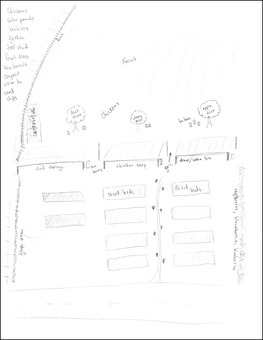 A few weeks ago Ted Baker invited me to be a guest on his morning radio show. He wanted to talk about the egg co-op following the City of Geneva's first demand to halt the project. During our conversation he asked a simple question: "Why are you so determined to pursue this project?"
A few weeks ago Ted Baker invited me to be a guest on his morning radio show. He wanted to talk about the egg co-op following the City of Geneva's first demand to halt the project. During our conversation he asked a simple question: "Why are you so determined to pursue this project?"
Like his question, the egg co-op is conceptually simple: A group of people share the responsibility of caring for a flock of hens, and in return they share the eggs produced by those hens. That's it. Of course there are all the little details of how to care for the hens - what food they need and how to keep their water from freezing in the winter and where they live and what happens when they stop laying - but at its core it's a basic barter economy. Food and water and love go in, eggs come out.
One hundred fifty years ago, chicken keeping was just what people did; families kept a small flock as part of their daily food solution. One hundred years ago the U.S. government encouraged a return to chicken-keeping as a way of subsisting through the war years. Fifty years ago the suburbs rose and people could escape the cramped cities while retaining their convenience, and urban chicken-keeping fell out of favor to further distance ourselves from the hard life of our grandparents. Fifteen years ago urban chicken-keeping returned and became a symbol of progressive communities, a way to take control of our food systems without reliance on industrial farms. Now it's common across this country and allows strong and aware communities to bond together in hope for the future.
People keep chickens in Geneva, but here it's a criminal activity. There are backyard flocks tucked away behind fences and around hedgerows, kept secret because they are prohibited under City Code. They cause no harm and they bring great benefit to those willing to quietly perform this small daily act of civil disobedience.
But an egg co-op, with 25 hens and dozens of families, can't be hidden in a small patch of grass behind the back shed. So why undertake something illegal - and forcefully persecuted - in most parts of this city?
Because it shouldn't be so hard.
It shouldn't be so hard for like-minded individuals to come together in shared purpose. It shouldn't be so hard to produce our own eggs. It shouldn't be so hard to do something we've been doing for centuries. It shouldn't be so hard to care responsibly for an animal that largely takes care of itself.
The egg is a food that probably every Genevan eats at least once a week, maybe every day. It's a basic ingredient in most of our recipes and a staple of our breakfasts. It contains nutrition and sustenance, and the egg laid by the hen which has room to walk around is even better. We dye eggs at Easter and we stand them on end at the solstice. Everyone has their favorite preparation, be it scrambled or sunny-side-up or hard boiled. It's part of our lives.
And yet many children don't know where they come from. They don't know that the eggs we buy in stores are unfertilized, that they don't require roosters and they'll never become chicks. They don't know that eggs produced by free range hens don't need refrigeration, and indeed the United States is the only country in the world in which our usual source of eggs - the industrial chicken farm - is so contaminated with bacteria that every egg must be washed and refrigerated before being sold to the public. They are taught by unknowing parents that chickens are dirty and smelly and mean and noisy when in fact the very opposite holds true.
Slowly the "why" becomes the "how" as we endeavor to find methods to share, and teach, and overcome. We find corners of the city where chickens are allowed and we put them there. We arm ourselves with building permits to erect coops and fences so that passersby may see in, but the chickens don't wander out. We muster patience and understanding to draw down misconceptions and we resolve to spend a year, two years, four years pursuing our goal.
Why? Because it shouldn't be so hard to secure a small part of our daily food. It shouldn't be so hard to pass this knowledge along to our children. And maybe if we take up our pens and our pitchforks and our picket signs now, if we expend the effort and engage the ignorance and extol the good that is truly and undeniably there, the next generation won't have to.
|
